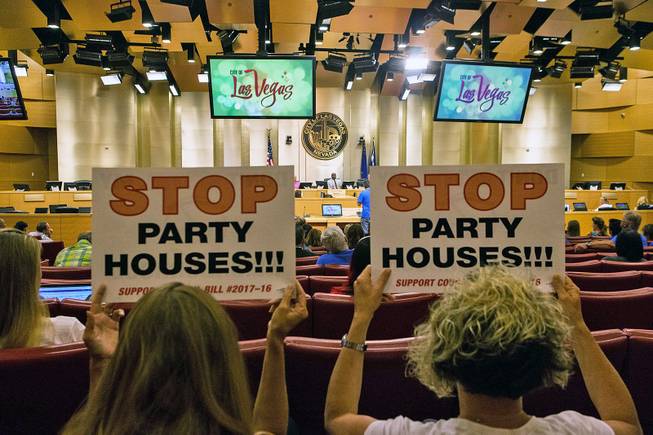
Residents listen to comments on proposed amendments to Las Vegas ordinances regarding short-term rental properties, during a meeting at Las Vegas City Hall in downtown Las Vegas, Monday, June 19, 2017.
Monday, March 18, 2019 | 2 a.m.
Since the city of Las Vegas passed sweeping restrictions on new short-term rentals in December, city officials are now faced with a difficult task: enforcing the rules.
There were 168 short-term rentals in Las Vegas that were licensed to operate in fiscal year 2018, according to the Department of Planning. That number includes homes rented out on all short-term rental platforms, such as Airbnb, HomeAway and VRBO.
But a quick search for “homes” in “Las Vegas, NV” on Airbnb.com, one of the most popular of these platforms, generates more than 300 results alone, suggesting that many properties listed on the site are being rented out illegally.
That discrepancy has kept the city’s Code Enforcement Office busy, as city officials frequently investigate speculated short-term rentals, and ensure that existing ones are complying with the law.
As of 2017, short-term rentals in Las Vegas can only operate if the owners obtain a business license, and only one short-term rental is permitted per 660 feet. In December, the city council cracked down on the practice even more, voting to limit new short-term rentals to owner-occupied homes only; existing short-term rentals that aren’t owner-occupied may continue to operate.
To enforce these rules, the city has established a short-term rental hotline and invested in a platform, UHost, that identifies illegal rental listings. Last year, the city received an average of 80 calls per month to its short-term rental hotline.
“That’s probably the best thing we have that’s available to people,” said Mary McElhone, the city’s deputy planning director.
Once an unlicensed property is identified, through UHost or tips from residents, the city will investigate the case. If the property is being rented out without a license, then the city will issue a notice and order informing them that they have 10 days to stop renting.
After that, the party could be fined $500 for each day that they continue to rent out their property. Last fiscal year, the city issued 174 notices and orders, and collected $22,688 in civil penalties for both licensed and unlicensed properties. In addition, the city collected $151,096 in licensing fees in the 2018 fiscal year.
Meanwhile, ensuring that licensed properties are complying with the city’s extensive short-term rental zoning code is a separate process, McElhone said. The zoning code has dozens of restrictions and guidelines for short-term rentals; for example, guests are not allowed to park in the street, and they are forbidden from playing music outdoors. And since December, the city must also ensure that new short-term renters continuously live in the homes they are renting out.
The most common violations for licensed properties, McElhone said, are related to trash management and parking. Repeat offenders can have their licenses revoked, which happened on five occasions last fiscal year.
“But we make sure the owners are properly educated,” McElhone added.
Mayor Pro-Tem Lois Tarkanian, who has been one of the most vocal local critics of short-term rentals, believes that issues relating to these types of properties have become less common and more manageable since the city started to regulate the practice.
“Right now, I’d say it’s working well,” Tarkanian said. “You can’t go by the numbers exactly, because it takes a while to follow the steps.”
Noticeably absent from some discussions about enforcement is the rental companies themselves. While Airbnb’s Las Vegas site lists resources for would-be hosts, including information about the city’s short-term rental laws, it also states that it does not “provide legal advice.”
“Airbnb's Responsible Hosting page clearly outlines Las Vegas' home sharing rules and we ask all of our hosts globally to certify they understand and follow local rules before listing their space on our platform,” Laura Rilos, spokesperson for Airbnb, wrote in an email statement.
Rilos also characterized Las Vegas’ restrictions as penalizing for “homeowners and guests” and said the company wishes the city would reverse course.
“We hope the city will take steps soon to involve all stakeholders in crafting balanced legislation,” she wrote.
While Airbnb isn’t the first to have criticized Las Vegas’ regulations as unfairly stringent, the city remains the only municipality in Clark County that hasn’t banned short-term rentals outright.
But Tarkanian, who is nearing the end of her last term on the council, believes that could change. She wonders if the city’s short-term rental laws will soon be challenged depending on who is elected to the council in June.
“I think people are waiting until I leave, and then they may want to come and change it or tinker it a little,” she said.
